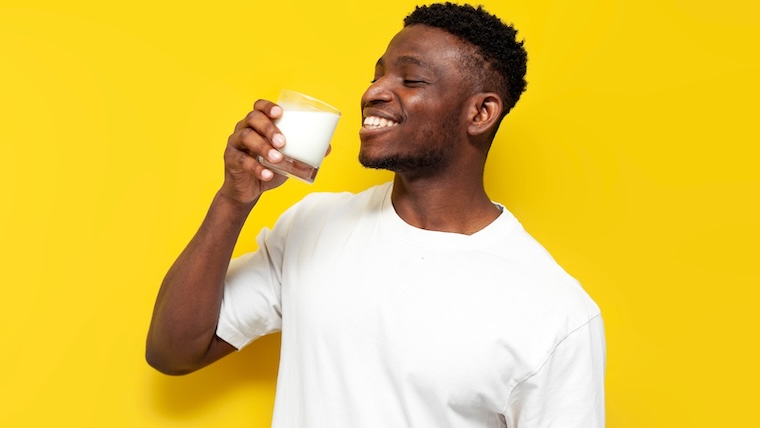Hydration is vital to health and physical performance. While it seems common sense that drinking water is the most efficient way to stay hydrated, is that true? Are there more hydrating beverages than water?
Dr. Layne Norton addressed hydration myths and dissected research comparing the hydrating effects of popular beverages.
- Milk, orange juice, and hypotonic* drinks are superior hydration options due to their electrolyte and carbohydrate content.
- Caffeinated drinks like coffee and soda hydrate as effectively as water with moderate consumption.
- Alcoholic beverages, in moderation, hydrate similarly to H2O.
*Hypotonic is “having a lower osmotic pressure than a particular fluid, typically a body or intracellular fluid.”
[Related: Fructose: Friend or Foe?]
Does Coffee/Caffeine Dehydrate You?
Dr. Norton first debunked the popular belief that coffee, with its caffeine content, causes dehydration. While it’s true caffeine inhibits antidiuretic hormone (ADH), which can increase urination, the mechanism doesn’t necessarily cause dehydration.
The Best Hydrating Beverages
Dr. Norton cited a study comparing the nourishing effects of several drinks, including oral rehydration solutions (ORS), milk (full-fat and skim), orange juice, sports drinks, cola, diet cola, coffee, tea, water, sparkling water, and even beer, or Lager. (1)
The most hydrating beverages were:
- Skim milk and semi-skimmed milk
- ORS (e.g., Gatorade, Pedialyte)
- Orange juice
These drinks were better than water for hydration. Coffee, other caffeinated drinks, and all beverages included in the trial were as hydrating as H2O.
Caffeine & Hydration
Caffeinated beverages are likely to hydrate as effectively as water due to their modest caffeine amounts. For example, a 12-ounce can of Diet Coke only has roughly 46 milligrams (mg) of caffeine, whereas an 8-ounce cup of coffee contains about 95mg of caffeine.
What’s “a lot of caffeine”? While it depends on individual tolerance, two to four cups daily is not uncommon for many coffee drinkers.
- Despite higher servings — 3mg per kg of body weight (approximately 300mg for Norton) — coffee is still hydrated, similar to water.
- Only at very high amounts of 6mg per kg of body weight — over five cups of coffee at once — did urine output increase, though not drastically.
Beer was also as hydrating as water despite alcohol’s known diuretic effects. However, Dr. Norton thinks it might be dose-dependent, similar to caffeine. “Perhaps compounds are acting in opposition to caffeine,” he posits.
How to Hydrate
“Milk appears to be a great hydrating agent,” as well as orange juice, Dr. Norton recounted. However, milk isn’t always practical due to stomach discomfort, and some don’t want the high sugar or acidity from orange juice.

Quality ORS seems to be the most versatile option. ORS should be hypotonic, meaning they contain a lower concentration of electrolytes than the electrolyte concentration in the body’s cells.
Dr. Norton avoids zero sugar ORS, saying, “A solution that doesn’t have carbohydrates is not as hydrating.” Carbs enhance hydration by aiding sodium transport in the intestines. “About 16 grams per liter can get you what you want,” Dr. Norton advised.
While these are great options for staying hydrated, water remains effective and oftentimes the most accessible.
More In Research
- Creatine Monohydrate vs. Hydrochloride — What’s the Difference?
- Develop These 5 Habits for a Leaner Physique
- Do You Actually Need Carbs Before Training?
Reference
- Maughan, R. J., Watson, P., Cordery, P. A., Walsh, N. P., Oliver, S. J., Dolci, A., Rodriguez-Sanchez, N., & Galloway, S. D. (2016). A randomized trial to assess the potential of different beverages to affect hydration status: development of a beverage hydration index. The American journal of clinical nutrition, 103(3), 717–723. https://doi.org/10.3945/ajcn.115.114769
Featured image via Shutterstock/Bohdan Malitskiy